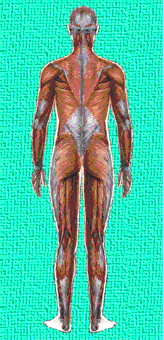|

Book
Center

Primer

Proportion

Shading & Texture

Construction

Visitor's
Center
|  |

The Superficial Muscles of the Body
The muscles of the body create most of the exterior form of the body. These undulations in the surface are what artists have always sought to portray. The characteristic flexing of the muscles profoundly changes the outside structure of the figure because when one muscle moves, others follow. For instance, when one lifts their arm, there is movement in the area of the scapula (shoulder blade), lower back, buttocks, and leg muscles. When drawing the figure, an artist must adapt each time the figure moves.
The Superficial Muscles: Muscles which occupy the layer closest to the surface of the skin are called superficial muscles. These are easily displayed on a person who has developed their physique for show or physical performance. Below is a list of muscles which may help to diagram and draw the figure.
- Front-
- The shoulder muscles are called deltoids. These triangular muscles define the upper shoulders.
- The palmaris longus muscle will protrude in the wrist area when you make a fist and flex your biceps.
- Biceps are easily recognizable large bumps on the upper inside of the arm. These have been used by artists to symbolize physical strength especially in men.
- The pectoralis muscles span the chest. They are often developed by body builders and also are used to symbolize strength.
- The abdominal muscles create rhythms and changes in the stomach area. They are generally drawn as four vertical segments next to four others. Be sure not to overemphasize these. Most people's abdominal muscles do not distinctly protrude.
- The sartorius muscle is a long muscle that begins on the outside of one's waist and wraps around to the inside of the knee.
- Back-
- The sternocleidomastoid muscle is the main muscle on the side of the neck.
- The trapezius covers a large section of the upper back. It conceals the upper part of the shoulder blade.
- The latissimus dorsi occupy the middle back on either side.
- The gluteus maximus make up the back of the buttocks.
- The gastrocnemius is the calf muscle which are each divided into two hemispheres.
Questions or comments can be forwarded to Ralph Larmann at the University of Evansville. | [non-Java animation]

The animation above shows the superficial muscles of the body from front and back. Graphic fade from back to front.
  
|




